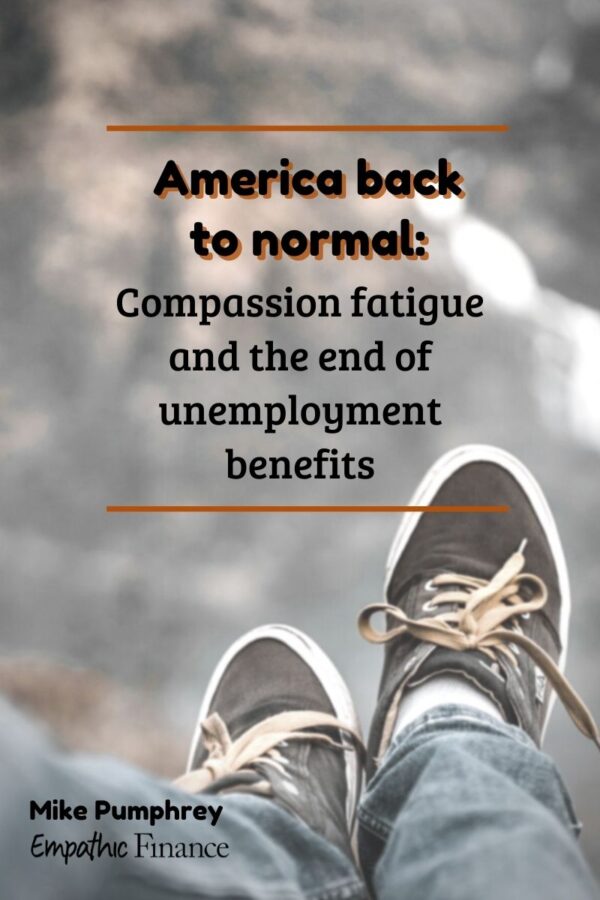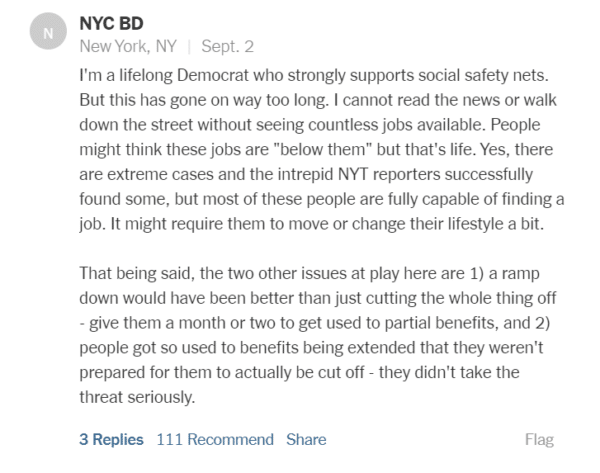As the pandemic rages and unemployment benefits are ending, I talk about how to view the situation and what you can do for yourself.
In March 2020, in response to this new pandemic that was causing people to get uncontrollably sick all around the world, our country’s leaders did something that they don’t normally do: come together to agree on a plan to help support all Americans who were struggling through this crisis.
This included extra unemployment benefits and other financial aid to get people through a situation where it was deemed unsafe to both work and live normally.
Now, in September 2021, with the pandemic raging and cases and hospitalization almost hitting their full pandemic highs, our country’s leaders have decided: eh, go get a job.
And so have many of us, apparently.
So, we need to talk about compassion fatigue, and also what to do now.

Table of Contents
Compassion fatigue
To explain compassion fatigue as it relates to the current evolution of our economic crisis, it helps to read the comments. 😱
I read the New York Times comments on certain articles, mainly because the Gray Lady’s readers employ a basic standard of decency that is nonexistent in other comment sections.
So the NYT published an article titled: “Federal Jobless Aid, a Lifeline to Millions, Reaches an End“:
Here’s a sample:
Three federal programs will end this weekend. One, which extended regular benefits beyond the 26 weeks offered in most states, covers about 3.3 million people, according to the Century Foundation. A second program, Pandemic Unemployment Assistance, covers 4.2 million gig workers, the self-employed and others who don’t qualify for standard benefits. Nearly three million additional people will lose a $300 weekly federal supplement to other unemployment benefits.
When Congress last renewed the programs in March, as part of Mr. Biden’s American Rescue Plan, policymakers hoped that September would represent a return to normal for the economy. If most Americans were vaccinated and the pandemic was under control, then schools and offices could reopen and people could return to work.
But the rise of the Delta variant has complicated that picture. Major employers across the country have shelved their return-to-office plans. International tourism remains largely shut down, and restaurants, which were packed for much of the summer, are seeing reservations slow.
“We’re in a different place now than we thought we were going to be,” Ms. McCarty said. “The Sept. 6 deadline made sense maybe in May and June. It seems preposterous now.””
And now, here is the top comment on that article:
Sorry, time to go find a job. Ask any business owner, hiring people right now is next to impossible. Nobody wants to work. And here in New York that is with a $15 minimum wage! I talk to local business owners all the time, they don’t even get applications. And this is in an economy with a record number of job openings. It isn’t that people are opting for other jobs, they’re opting for no job. It’s been plain as day for a while now. And I will be interested to see if my prediction comes true, that people will now take any job they can get. They’ll be scrambling to find work now that the sugar is over.

Many of the rest of the comments were kind of along that line:



I read all that and I thought: “well, we’re screwed.”
Telling it straight
Let’s get some things out of the way:
- There exist some people who don’t want to go back to work and will mooch off the system as long as they can.
- We are still in a global pandemic. It never ended.
- The lull in cases this summer has given way to record hospitalizations (including for children) and case/death numbers approaching historic peaks.
- Yes, we thought we’d be in a different place now. But we’re not.
- The Delta variant means that people are getting sicker.
- Think you’re safe because you’ve gotten vaccinated? Have you heard about the new “Mu” variant which may evade the immune system?
- Millions of people who got behind in their rent are about to be evicted. We’re about to see newly-houseless people battling COVID in record numbers.
- Many states ended unemployment benefits early. There was no jump in employment because people were no longer getting benefits.
- Red-state freedom toddlers are literally killing people for having been asked to wear masks in grocery stores. Do you want to work there?
- Got kids? Good luck getting back to work when child care is unavailable due to COVID, or their school closes due to an outbreak.
- Each week now, $5 billion dollars is going to be immediately wiped out from consumer spending. Even if those people all get jobs, they’re not getting them tomorrow. Economic shock, anyone?
- Take a guess which groups are going to be more affected by these changes. Go on, I’ll wait.
This is about to suck for a lot of people. Unnecessarily.
We’re going to learn the hard way
The famous, if apocryphal, quote is “Americans can always be trusted to do the right thing, once all other possibilities have been exhausted.“
The economic shock of so much consumer spending being immediately wiped out will likely cause more job losses, not job gains.
And the U.S. will either backtrack and try to stop up the tide of economic misery, or let people suffer, and hope that they are disadvantaged enough that they can’t suffer publicly.
(Or maybe the pandemic will go away by Easter.)
Compassion fatigue is a real thing. There is only so much suffering that you can empathize with before you actually run out of the ability to do that. It’s true on an individual level and on a societal level. I understand that.
But empathy is a required skill for living in a society. If you can’t stomach the emotional ability, then we need to build compassion into the guardrails of our society.
But no, it’s “get a job you lazy ****“. Because that’s really what’s going to help here.
What to do now
The answer is as eternal as it is unsatisfying: you need to get your financial house in order. You need to make a plan.
This is true whether you’re unemployed or not. If you’re unemployed, you have an income problem, so you need to fix that by utilizing your network, your skills, and your tenacity. (Also, you might as well keep applying, against the possibility that they restart unemployment benefits again. You don’t want to have a break in your weekly claims.)
If you’re employed, you’re not unaffected. You may have an income problem or you may have a spending problem. But until you know how much you need to live on, for your current needs as well as your future needs, your picture is incomplete.
(Forbes has a good article on what the unemployed can do now to protect themselves once benefits expire.)
No one is coming to save you. You’re going to need to do it yourself.
Luckily, that’s something you are perfectly capable of doing. (And I can help you.)
For another time
Maybe someday I’ll talk more about how to stave off personal compassion fatigue. But for now, I think it’s just time for mourning in America.
Note: This is probably the best analysis I’ve found of the current predicament for workers, which also goes into policy recommendations that I’ve avoided detailing here. If you’re even a little bit interested in learning more, click this link.


